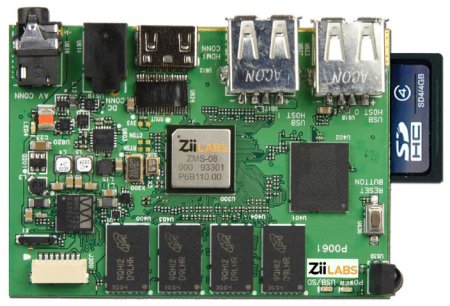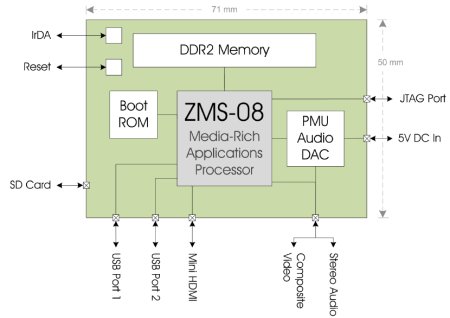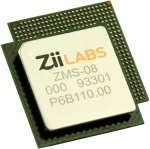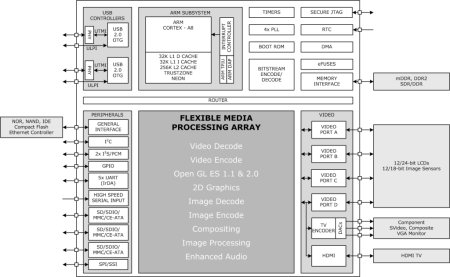HD media hub design runs Android, Linux
Jan 6, 2010 — by Eric Brown — from the LinuxDevices Archive — 11 viewsZiiLabs announced an HD-ready media hub reference design incorporating its 1GHZ, ARM Cortex-A8-based ZMS-08 system-on-chip (SoC). The Zii SiVo Digital Home Platform provides 1080p Blu-ray quality HDTV and 3D graphics UI for low-power connected home devices, and offers a development kit for Android or ZiiLabs' Plaszma Linux stack.
The Zii SiVo Digital Home Platform is said to include a complete design kit for a compact, customizable "hub," apparently a sort of HD-ready IP set-top box and media server. The platform is based on the ZMS-08 SoC announced in November. (See farther below for more on the ZMS-08 and other products from ZiiLabs, a Creative Technology subsidiary.)

Zii SiVo board
(Click to enlarge)
Specifications listed for the Zii SiVo board include:
- Processor — ZiiLabs ZMS-08 @ 1GHz
- Memory — 512MB DDR2 memory with firmware Boot ROM
- Flash expansion — External SD/MMC card slot
- USB — 2 x USB 2.0 type A host ports
- Other I/O:
- HDMI 1.3a mini port
- Composite video (via 4 pole 3.5mm plug)
- Infrared input
- JTAG debug port
- Audio — High-quality audio DAC; 3.5 mm stereo headphone jack
- Video formats — H.264 High-Profile, MPEG-1/2, MPEG-4 (XVid & DivX), WMV9/VC1 (SP/MP), Motion JPEG, H.263
- Image formats — JPEG, BMP, PNG, GIF, TIFF
- Audio formats — MP3, WMA8 Std & Lossless, AAC-LC / LTP / HE v1&2, WAV, FLAC, ADPCM, MIDI, G726/722/711
- Web software — Web 2.0 browser, Internet streaming, video-conferencing, Adobe Flash Lite 3.1/Flash Player 10, AIR
- Power — DC 5V input board supply; power management unit
- Dimensions — 2.8 x 2.0 x 0.5 inches (71 x 50 x 12mm)
- Operating system — Android and Plaszma (Linux) OS

Zii SiVo block diagram
(Click to enlarge)
The software design package includes the following components, says ZiiLabs:
- Schematics
- Gerbers
- Design files
- Bill of materials
- Mechanical drawings
- 3D CAD model
- Assembled PCBs
- Board support package
- Operating system, middleware & CODECs
ZMS-08 and ZiiLabs StemCell Computing
In July of last year, ZiiLabs stormed onto the scene with a portable media player (PMP) called the Zii Egg StemCell Computer (pictured below). The device was based on its homegrown, dual ARM9-core "ZMS-05" SoC and Plaszma Linux distribution. The Zii Egg offers a 3.5-inch display supporting 1080p HD video, plus an HD video camera, WiFi, GPS, and Bluetooth. In December, the company followed up with a similar Android and Plaszma Linux smartphone reference design called the Zii Trinity.

Zii Egg StemCell Computer

Like the ZMS-05, the ZMS-08 offers ZiiLabs' StemCell Computing array, which features 64 programmable floating point processing elements that offload media processing tasks from the ARM core(s). As a result, both chips offer 1080p playback using H.264, plus 1080p, 24fps encoding, and simultaneous H.264 encode and decode at 720p for videoconferencing, says the subsidiary.
Like the ZMS-05, the ZMS-08 is supported by ZiiLabs' Linux-based Plaszma OS and related software development kit (SDK), as well as a "Zii Optimised Android" distribution.
By moving up to a 1GHz ARM Cortex-A8 core, said to make the SoC four times faster than the dual ARM9 ZMS-05, the ZMS-08 boosts video playback to Blu-ray quality and 60fps frame rates, while improving videoconferencing performance to 30fps, claims ZiiLabs. The ZMS-08 is also said to add OpenGL ES 2.0 2D/3D graphics support, with a touted 1 Gpixels/sec fill rate. Other touted new features include an integrated HDMI controller, dual USB controllers, Flash acceleration, and Xtreme Fidelity X-Fi audio.

ZMS-08 block diagram
(Click to enlarge)
Availability
No information was provided on the pricing or availability of the Zii SiVo Digital Home Platform. The SiVo platform will be demonstrated by ZiiLabs at their private suite at CES this week, and by ARM in the ARM Home room (#35551MP, South Hall). More information may be found here.
This article was originally published on LinuxDevices.com and has been donated to the open source community by QuinStreet Inc. Please visit LinuxToday.com for up-to-date news and articles about Linux and open source.